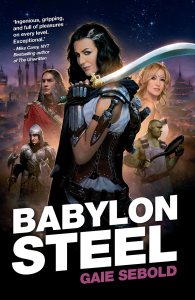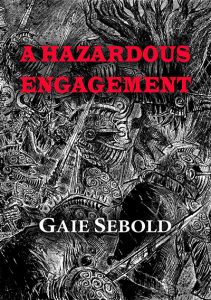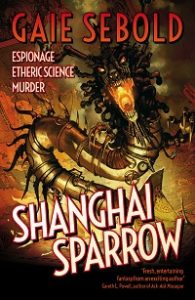Women in SFF Author Spotlight – Gaie Sebold (BABYLON STEEL)
Gaie Sebold’s debut novel introduced brothel-owning ex-avatar of sex and war, Babylon Steel (Solaris, 2012); followed by Dangerous Gifts. The steampunk fantasy Shanghai Sparrow came out in 2014 and Sparrow Falling in 2016. Her short stories have appeared in a number of venues, including the BFS Award shortlisted Fight Like a Girl.
She is a freelance copy editor, a graduate of Milford SF Writers’ Conference, and was a judge for the 2017 Arthur C Clarke Award. She has worked as a cleaner, secretary, waitress, till-basher, stage-tour-manager, editor, and charity administrator. She grows vegetables, experiments with cooking dishes from around the world, and commits occasional poetry.
She lives in leafy suburbia with writer David Gullen and a small grey cat.
Her website is www.gaiesebold.com and you can find her on twitter @GaieSebold.
Welcome to the Hive, Gaie. Let’s start small: tell us about a great book you’ve read recently!
I’m currently reading the Book of Swords collection edited by Gardener Dozois, which is packed with stories from some of my favourite authors. I’m in edits on one project and writing another, and I find it easier to focus on short stories when I’m up to my neck in longer projects.
 Okay, time to escalate things: reality warps and you suddenly find yourself leading a D&D-style party through a monster-infested dungeon. What character class are you, and what’s your weapon of choice?
Okay, time to escalate things: reality warps and you suddenly find yourself leading a D&D-style party through a monster-infested dungeon. What character class are you, and what’s your weapon of choice?
Back in the days when I used to LARP I was a front-line warrior and loved every minute of it. Unfortunately these days I’m a bit middle-aged and extremely out of practice at real-life longsword, so…maybe bard? Except my singing is nothing to write home about either, frankly. Is there a class that involves telling stories to the monster until it decides we’re too interesting to murder? Or a Cook class? Can I cook my way through a dungeon? “Oh, no, Monster, you don’t want to eat us, this Bolognese is a lot nicer, it’s my mum’s recipe, you know…” – and of course you can always bash things with a really good solid saucepan. Or use it as a helmet.
When you’re not trawling through dungeons, how do you like to work? (In silence, with music, or serenaded by the damned souls of a thousand dead shrimps? Do you prefer to type or to hand-write? Are you an architect or a gardener? A plotter or a pantser? D’you write in your underwear, or in a deep-sea diver’s suit?)
I usually work in silence, unless I’m having real trouble focusing, then I’ll use something like film music. It has to be instrumental, though. I find lyrics too distracting.
I type – I learned to touch-type when I was taking secretarial training. We were taught on manual typewriters, which gives you some idea of how long ago this was…I still remember the evil little xxxx of a machine that stripped the skin off your fingers if you missed a key and your finger went down between them. Ow.
But I find it much easier than handwriting. My handwriting’s always been awful, and if I try and write too fast even I can’t read it later.
As to Architect or Gardener…well, I am a gardener, and I think my approach to writing is probably similar! Throw a lot of stuff in the ground, see what comes up, weed as necessary. Occasionally realise a plant isn’t going to survive and pull it up, often with tears and guilt.
I used to be a total pantser (that sounds like an insult, somehow. You total pantser). I have become a lot more of a planner, but as Field Marshal Helmuth Von Moltke the Elder put it (and isn’t that a glorious name? If you put it in a fantasy people would say it was over the top), ‘no plan survives contact with the enemy’. As I learn more about the world and the characters, the plan changes.
I work mainly in comfortable clothes, though if I need a bit of a push to get going I’ll sometimes dress up, in bright colours and jewellery and a general arty sort of thing, so that I feel more like my own mental image of a writer. I also wear fingerless gloves a lot, because my hands get very cold.
Tell us a little bit about your writing method!
“Method” might be an exaggeration. I get an idea, I write around it, take a load of notes, maybe write an opening page or some dialogue or a description of a landscape or a character. I go back and forth between a sort of idea-brew of fragments and actual pages that might end up in the book. I write a bit, pause to plan, try and get some more understanding of the world or the characters, write a bit more. Sometimes I look at the amazing fantasy art that’s available online to get hints for the world. I’ve gone to the National Portrait Gallery to find faces for characters, and spent three hours thinning grapes and muttering into a voice recorder when I get stuck on plot. I’m not sure any of this counts as a method, exactly.
Whether it does or not, there’s certainly some great tips there!
What (or who) are your most significant female fantasy influences? Are there any creators whom you dream of working with someday?
Anne McCaffrey, Angela Carter, Robin Hobb, Ursula Vernon…there are a lot of female authors I love, but I think those are the most obvious female influences I am aware of in my own work.
Collaboration is another matter: I’ve done it a few times with short stories, and it’s been fun, but novels are a huge commitment. My partner and I have come up with ideas together, but we decided in the end that we’d be better letting each of us take one of the ideas and run with it separately.
I suspect working with one of my heroes would be a bit overwhelming – I’m not sure I’d dare put my own ideas forward, because I’d be convinced they wouldn’t be as good as theirs!
 What was the last thing you watched on TV and why did you choose to watch it?
What was the last thing you watched on TV and why did you choose to watch it?
Doom Patrol. Mad as a fish, but I loved it. My partner found it and we were both hooked after one episode. I really enjoy superheroes (or, in this case, less-than-super heroes) when they’re interesting and emotionally complex, though it’s not a genre I’m ever likely to write in. My other recent favourite was Jessica Jones.
Alternatively, what games have you enjoyed recently?
I don’t really do computer games, unless you count Candy Crush! I got so frustrated just trying to get my characters to move. I already know how to walk and turn a corner, I can’t be arsed trying to learn all over again. I know there’s some great art and storytelling in games, and I’ve written a tie-in novella for the game Strange Brigade (which was great fun to do), but playing them just isn’t for me.
The world shifts, and you find yourself with an extra day on your hands during which you’re not allowed to write. How do you choose to spend the day?
Almost certainly gardening, if the weather’s halfway decent. If not, probably cooking and/or reading. Oh dear, not very exciting, I’m afraid.
We can absolutely relate with choosing the chilled route over the exciting one!
Can you tell us a little something about your current work(s) in progress?
I’m in final edits on an epic fantasy. It involves people struggling to overcome long-held prejudices and make sense of a world that isn’t what they thought it was. With axe-wielding and banter.
I’m also writing a Georgette Heyer-influenced Regency-punk bromantic romp about wine-tasting and international murder.
What’s the most (and/or least) helpful piece of writing advice you’ve ever received?
There are so many! I really like Anne Lamott’s “Bird by Bird” principle –to approximate wildly, you do the bit you can do now, even if it’s five minutes of notes, or a paragraph. Any tiny bit you can do is better than nothing, and you’ve done something. You’ve broken that first barrier and got the wheel spinning. I took years to finish my first (pretty terrible) trunk novel partly because I somehow got into the mindset that I had to write for hours at a time to do anything useful.
Every writer encounters stumbling blocks, be it a difficult chapter, challenging subject matter or just starting a new project. How do you motivate yourself on days when you don’t want to write?
I tell myself I’m going to write for five minutes. I pretty much always end up writing for longer. I put on the essential oil burner, with rosemary and bergamot and holy basil. I make extra-special coffee with spices. I dress in clothes that make me feel writerly. If I’m stuck on plot I may go and do something repetitive and mindless, like weeding, while muttering angrily at my characters. (Disconcerting for the neighbours). I may go and rant at my partner about whatever isn’t moving. Most of the time he doesn’t even have to answer, just talking about it can be enough to unstick the gears. If I’m having trouble with a particular scene, I’ll work on a different part of the book. Sometimes I go and do a bit of research, which is at least productive procrastination. On bad days I may end up spending five hours reading books about writing and five minutes actually writing, but those are less frequent than they used to be. But other days you just need a break, and if it really isn’t happening, I’ll take one.
 If you could visit any country at any point in history, where/when would you go, and why?
If you could visit any country at any point in history, where/when would you go, and why?
Ooh, that’s tricky. Minoan Crete would be one. But I’d also love to see the building of Stonehenge, or meet the Red Lady of El Mirón or the people who built the Tomb of the Eagles. There’s so much astonishing history everywhere you go. Meeting people from so long ago, to find out how they saw the world, their ideas about death, about spirituality and their place in the world – oh, it would be fascinating. With the caveat that someone had invented a universal translator, and that I’d have full protection from all the lovely ancient diseases and possible random violence – not to mention protecting them from any diseases I might be carrying. And all the other time-travel caveats.
Who are your favourite female characters in literature or pop culture? And do you have a favourite type of female character you enjoy writing?
It’s hard to choose favourites, but…Fevvers, from Angela Carter’s Nights at the Circus. Alise Finbok, from Robin Hobb’s Rain Wild series. Phèdre nó Delaunay from Jacqueline Carey’s Kushiel’s Legacy series. Digger, from Digger. Halo Jones, Jessica Jones, Granny Weatherwax, Magrat Garlick…I could go on.
I like writing rogues, women who don’t fulfil the tenets of respectability. Or women who are trying to break out of what’s been expected of them, one way or another. I enjoy writing women with complex skills, partly, I think, because I rather lack them myself: the ability to look at mechanisms or even furniture and understand how things are put together, how they work is like magic to me. I generally like writing women who are tougher, braver, (mentally or physically) and more skilled than I am, people I’d admire if I met them in real life.
Tell us about a book that’s excellent, but underappreciated or obscure.
Hmm. That’s really tricky. I suppose I have quite populist tastes! (I mean I could mention my partner David Gullen. His novel Shopocalypse is a wild futuristic ride which has become worryingly plausible in the last few years). I do think everyone should read Ursula Vernon’s wonderful, wise, funny, heart-wrenching graphic novel Digger, but it did win a Hugo and a Mythopoeic so it’s hardly that obscure. But I’m mentioning it anyway. In case anyone hasn’t read it yet.
Finally, would you be so kind as to dazzle us with an elevator pitch? Why should readers check out your work?
At the risk of sounding as though I’m bowing out of selling myself, I’ll let some Goodreads reviewers do it for me!
Babylon Steel: Babylon Steel, ex-sword-for-hire, ex-other things, runs the best brothel in Scalentine; city of many portals, two moons, and a wide variety of races, were-creatures, and religions. The Vessels of Purity are protesting against brothels, women in the trade are being attacked, it’s tax time, and there’s not enough money to pay the bill. So when the mysterious Darask Fain offers her a job finding a missing girl, Babylon decides to take it.
But the missing girl is not what she seems, and neither is Darask Fain.
In the meantime twomoon is approaching, and more than just a few night’s takings are at risk when Babylon’s hidden past reaches out to grab her by the throat.
“A fine rollicking adventure tale” “An assured epic fantasy debut”
Shanghai Sparrow: Eveline Duchen is a thief and con-artist, surviving day by day on the streets of London, where the glittering spires of progress rise on the straining backs of the poor. Where the Folk, the otherworldly children of fairy tales and legends, have all but withdrawn from the smoke of the furnaces and the clamour of iron.
Caught in an act of deception by the implacable Mr Holmforth, Evvie is offered a stark choice: transportation to the colonies, or an education – and utter commitment to Her Majesty’s Service – at Miss Cairngrim’s harsh school for female spies.
But on the decadent streets of Shanghai, where the corruption of the Empire is laid bare, Holmforth is about to make a devil’s bargain, and Eveline’s choices could change the future of two worlds…
“A breath of fresh air” “A delightful read”.
And for a month from 10th July, Babylon Steel is on sale on Bookbub at 99p!
If readers don’t want to commit to a novel without a taste of my work, I’ve a novella out from NewCon Press – A Hazardous Engagement, which is also available as an audiobook, and short stories in a number of anthologies including a Babylon Steel story in Wicked Women from Fox Spirit. That one, A Change of Heart, was nominated for a British Fantasy Award.
Thank you so much for joining us today Gaie!
